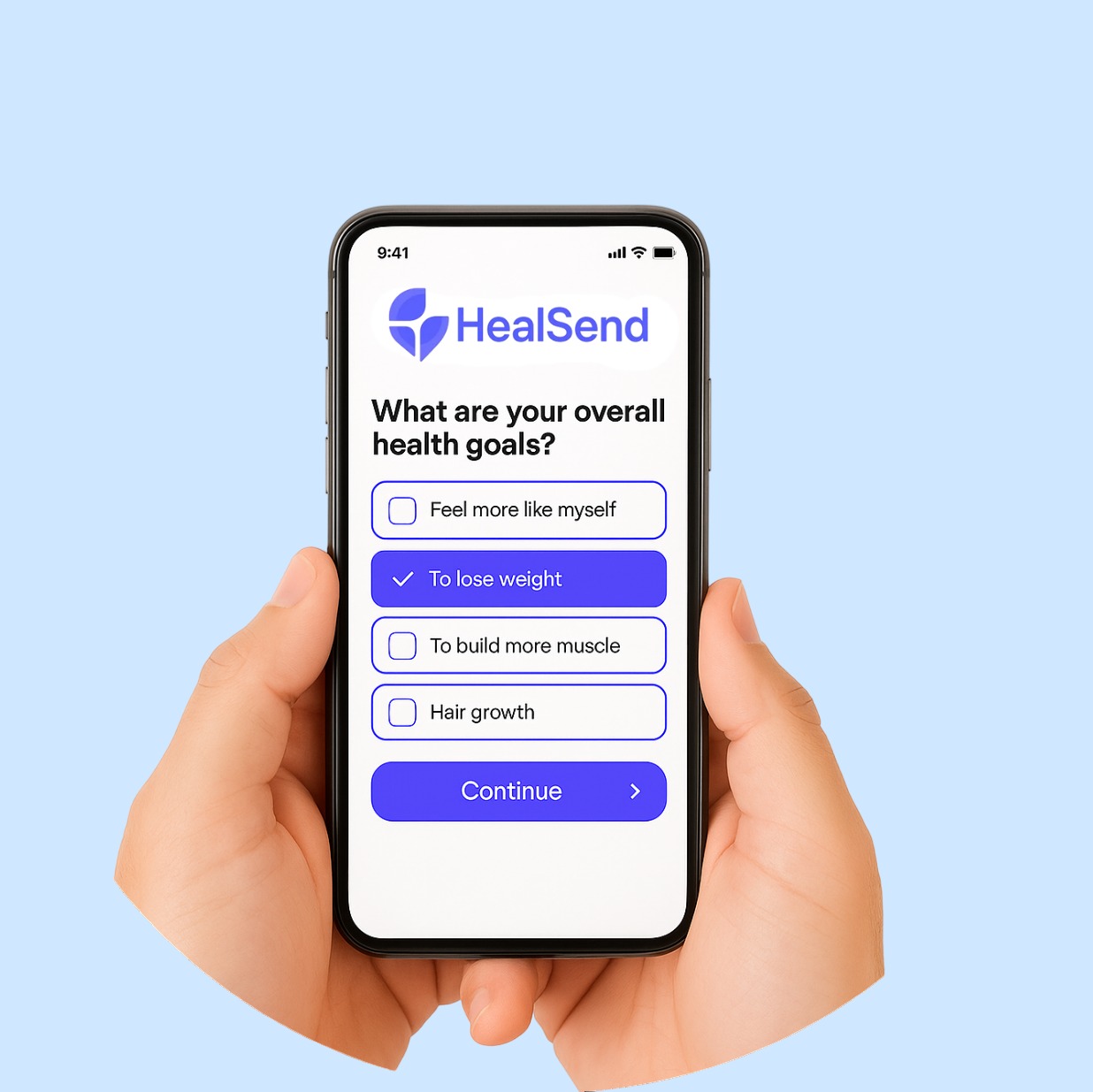
Lexapro vs Sertraline: What You Should Know
Transform your mental health journey with our top practitioners. Speak with a provider today to see what treatment is right for you.
- Appointments any day of the week
- Licensed healthcare providers in your state
- 24/7 patient support
The medications listed on this website are provided for informational purposes only.
Their inclusion does not guarantee they will be prescribed to any individual, as treatment decisions are ultimately at the discretion of healthcare providers.
In this article, we’ll delve into the specifics of Lexapro and Sertraline, comparing their benefits, side effects, and overall effectiveness. This comparison will help you understand which medication might be the better fit for your mental health needs.
Receive a personalized treatment plan from a medical provider after an online mental health assessment.
Understanding Lexapro and Sertraline

Understanding the fundamentals of these medications is crucial for anyone considering them as treatment options. It involves knowing not only what they are but also how they work and what distinguishes them from other SSRIs.
What is Lexapro?
Lexapro, or escitalopram, is an SSRI that is often prescribed to treat major depressive disorder and generalized anxiety disorder. It works by increasing the levels of serotonin, a neurotransmitter associated with mood regulation, in the brain. This increase can help improve mood, energy levels, and overall feelings of well-being.
Mechanism of Action
The mechanism of action for Lexapro involves its ability to selectively inhibit the reuptake of serotonin in the brain. This inhibition increases the availability of serotonin, which is believed to have a good influence on mood, emotion, and sleep. Unlike some other antidepressants, Lexapro is highly selective for serotonin, which might contribute to its tolerability.
Clinical Uses
Aside from treating major depressive disorder and generalized anxiety disorder, Lexapro is sometimes used off-label for other conditions. These may include social anxiety disorder and panic disorder. The decision to use Lexapro for these conditions depends on the healthcare provider’s judgment and the individual patient’s needs.
Dosage and Administration
Lexapro is typically administered once daily, with or without food, making it convenient for patients to incorporate into their daily routine. The starting dose is often 10 mg, which can be adjusted based on the patient’s response and tolerance. It’s essential to follow the prescribed regimen and consult with a healthcare provider if adjustments are needed.
What is Sertraline?
Sertraline, commonly known by its brand name Zoloft, is another SSRI used to treat depression, anxiety disorders, panic attacks, and obsessive-compulsive disorder (OCD). Like Lexapro, Sertraline increases serotonin levels in the brain, which can help stabilize mood and reduce feelings of anxiety.
Mechanism of Action
Sertraline works similarly to Lexapro by inhibiting the reuptake of serotonin. However, it also has slight effects on other neurotransmitters such as dopamine, which may contribute to its efficacy in treating a broader range of conditions. This broader impact can be beneficial for patients with complex or co-morbid disorders.
Clinical Uses
In addition to depression and anxiety disorders, Sertraline is often used to treat post-traumatic stress disorder (PTSD) and premenstrual dysphoric disorder (PMDD). Its versatility makes it a popular choice among healthcare providers, especially when treating patients with multiple symptoms or conditions.
Dosage and Administrasion
Sertraline is typically taken once daily, either in the morning or evening, and can be taken with or without food. The starting dose is usually 50 mg, but it can be adjusted based on the patient’s response. Consistency in taking the medication is key to achieving the best therapeutic outcomes.
Benefits of Lexapro and Sertraline
Both Lexapro and Sertraline have unique benefits that can make them suitable for different individuals. Understanding these advantages can help in making an informed decision about which medication may be more appropriate for your specific needs.
Lexapro Benefits
Lexapro is often praised for its relatively mild side effect profile compared to other antidepressants. Many patients report experiencing fewer adverse effects, which can contribute to a better overall treatment experience. Additionally, Lexapro is sometimes preferred for its effectiveness in treating anxiety as well as depression.
Mlid Side Effects
One of the significant benefits of Lexapro is its generally mild side effect profile. Patients often report fewer issues with sedation, weight gain, or sexual dysfunction compared to other SSRIs. This can be particularly advantageous for individuals who are sensitive to these types of side effects.
Effectiveness for Anxiety and Depression

Lexapro’s dual effectiveness in treating both anxiety and depression makes it a versatile option for individuals with co-occurring disorders. It has been shown to significantly improve symptoms in both conditions, providing relief for those who struggle with overlapping mental health issues.
Patient Tolerability
The tolerability of Lexapro is often highlighted in patient reviews and clinical studies. Many individuals find it easier to adhere to their treatment regimen due to the lower incidence of bothersome side effects. This can lead to better long-term outcomes as adherence is crucial for the success of antidepressant therapy.
Sertraline Review
Sertraline has been around for quite some time and has a solid track record of effectiveness. It is often chosen for patients dealing with a range of anxiety disorders, including OCD and panic disorder. Many users find that Sertraline helps them manage their symptoms more effectively, allowing them to lead more balanced lives.
Broad Range of Treatment
One of the key benefits of Sertraline is its ability to address a wide range of mental health disorders. Its effectiveness in treating conditions like OCD, PTSD, and panic disorder makes it a preferred choice for individuals with complex psychiatric needs.
Established Efficacy
With decades of use in clinical settings, Sertraline has a well-documented history of efficacy. This extensive track record provides reassurance to both patients and healthcare providers regarding its safety and effectiveness in managing various mental health conditions.
Positive Patient Outcomes
Many patients report positive outcomes with Sertraline, noting significant improvements in their symptoms and overall quality of life. Its ability to help stabilize mood and reduce anxiety contributes to these positive experiences, making it a reliable option for long-term treatment.
Comparing Lexapro and Sertraline: Side Effects
While both medications are generally well-tolerated, they do have potential side effects that patients should be aware of. Understanding these differences can help in choosing the medication that aligns best with your lifestyle and treatment goals.
Common Side Effect
Both Lexapro and Sertraline have similar side effects, which may include nausea, headaches, and insomnia. It’s essential to note that not everyone will experience these side effects, and they often diminish as your body adjusts to the medication.
Nausea and Digestive Issues
Nausea is a common side effect of both medications, particularly when starting treatment. This symptom usually subsides within the first few weeks as the body adjusts. Staying hydrated and taking the medication with food can help alleviate this issue.
Headaches and Dizziness
Headaches and dizziness are also frequently reported side effects. These can occur as the body acclimates to the medication but are generally temporary. If these symptoms persist, it’s important to discuss them with your healthcare provider, as dosage adjustments may be necessary.
Sleep Disturbances
Both Lexapro and Sertraline can cause sleep disturbances such as insomnia or excessive sleepiness. Finding the right timing for taking the medication can help mitigate these effects, and your healthcare provider may suggest taking it in the morning or evening based on your specific symptoms.
Lexapro vs Sertraline: Weight Gain

Weight gain is a concern for many when taking antidepressants. Both Lexapro and Sertraline can potentially lead to weight changes, although the likelihood and extent can vary from person to person. Some patients report weight gain as a more significant issue with Sertraline, while others find Lexapro to have a more neutral effect on their weight.
Individual Variavility
The impact of these medications on weight can vary widely among individuals. Factors such as genetics, lifestyle, and diet can influence how a person’s weight is affected. Monitoring weight changes and discussing them with your healthcare provider can help manage this side effect.
Lifestyle Modifications
Incorporating lifestyle modifications such as regular exercise and a balanced diet can help mitigate potential weight gain associated with these medications. Healthcare providers often recommend these strategies as part of a comprehensive treatment plan.
Long Long-term Considerations
For individuals concerned about long-term weight management, it’s crucial to have ongoing discussions with a healthcare provider. They can help tailor a plan that addresses both mental health needs and physical health goals, ensuring a balanced approach to treatment.
Effectiveness: Lexapro vs Sertraline
Determining the effectiveness of Lexapro versus Sertraline involves examining their impact on specific disorders and individual patient responses. Both medications have proven efficacy, but their suitability can depend on various factors.
Sertraline vs Lexapro for Depression
Both medications are effective for treating depression, but some studies suggest that Lexapro may have a slight edge in terms of efficacy and patient satisfaction. This can vary based on individual response, so it’s crucial to work closely with your healthcare provider to determine which medication is best for you.
Clinical Studies and Findings
Research comparing the two medications has shown slight differences in their efficacy for treating depression. Some studies indicate that Lexapro may lead to faster symptom relief, while others find both medications equally effective over the long term. It’s important to review these findings with a healthcare provider to understand how they may apply to your situation.
Patient Satisfaction and Prefferces
Patient satisfaction can play a significant role in the perceived effectiveness of a medication. Factors such as ease of use, side effects, and overall improvement in quality of life contribute to individual preferences. Engaging in open discussions with your healthcare provider can help align treatment options with personal expectations.
Individual Response Variability
The effectiveness of any antidepressant, including Lexapro and Sertraline, can vary widely among individuals. Genetics, co-existing medical conditions, and concurrent medications can all influence how a person responds to treatment. Personalized treatment plans are essential to achieving optimal outcomes.
Lexapro vs Sertraline for Anxiety

When it comes to treating anxiety, both medications have their merits. Lexapro is often favored for generalized anxiety disorder due to its calming effects, while Sertraline is frequently prescribed for OCD and panic disorder. Ultimately, the choice between the two will depend on the specific anxiety disorder being treated and the patient’s unique needs.
Targeted Anixiety Disorders
Lexapro is particularly effective for generalized anxiety disorder, providing relief from chronic anxiety symptoms. On the other hand, Sertraline’s efficacy extends to more specific anxiety disorders like OCD and panic disorder, making it suitable for patients with these conditions.
Symptom Management
The choice between Lexapro and Sertraline may also depend on the specific symptoms a patient is experiencing. Lexapro’s calming effects can be beneficial for reducing overall anxiety levels, while Sertraline’s broader impact on mood and anxiety can address more complex symptom profiles.
Co-morbid Conditions
For individuals with co-morbid anxiety and depression, both medications can offer significant relief. The decision to use one over the other may be influenced by the presence of additional conditions such as OCD or PTSD, where Sertraline may have a slight advantage.
Deciding Between Lexapro and Setraline
Choosing the right medication involves careful consideration of various factors, including medical history, personal preferences, and professional guidance. Making an informed decision requires weighing the benefits and drawbacks of each option.
Factors to Consider
When choosing between Lexapro and Sertraline, several factors should be considered. These include your medical history, current symptoms, and any other medications you may be taking. Additionally, personal preferences regarding potential side effects and the specific conditions being treated will play a significant role in the decision-making process.
Medical History and Current Symptoms
Understanding your medical history and current symptoms is crucial in selecting the right medication. Previous responses to antidepressants, the severity of symptoms, and any co-existing medical conditions should be discussed with your healthcare provider.
Concurrent Medications and Interactions
Potential interactions with other medications you are taking must be considered. Both Lexapro and Sertraline can interact with various drugs, affecting their efficacy and safety. Your healthcare provider can help assess these interactions and adjust your treatment plan accordingly.
Personal Lifestyle and Preferences
Your lifestyle and personal preferences, such as the importance of avoiding specific side effects or the convenience of a particular dosing schedule, should be factored into the decision. A medication that aligns well with your daily routine and preferences can improve adherence and treatment outcomes.
Consult with Your Healthcare Provider
It’s crucial to have an open and honest discussion with your healthcare provider about your symptoms and treatment goals. They can provide valuable insight and guidance, helping you make an informed decision about which medication is the best fit for you.
Collaborative Decision-Making
Engaging in collaborative decision-making with your healthcare provider ensures that your treatment plan aligns with your goals and expectations. This partnership allows for tailored adjustments based on your unique needs and responses to the medication.
Monotoring and Follow-up
Regular follow-up appointments are essential to monitor your progress and address any concerns or side effects. Your healthcare provider can make necessary adjustments to your treatment plan based on these evaluations, ensuring optimal therapeutic outcomes.
Patient Education and Support
Understanding your medication and treatment plan empowers you to take an active role in your mental health care. Healthcare providers can offer educational resources and support to help you navigate your treatment journey effectively.
Conclusion
Both Lexapro and Sertraline are effective SSRIs used to treat depression and anxiety disorders. While they share similarities, their differences may make one more suitable for certain individuals. By understanding the benefits and side effects of each medication, as well as consulting with your healthcare provider, you can make an informed decision that supports your mental health journey. Remember, finding the right medication can take time and patience. Be sure to communicate with your healthcare provider throughout the process to ensure you receive the best possible care.
Personalizeed Treatment Path
Ultimately, the journey to finding the right medication is a personal one, requiring consideration of individual responses and preferences. Being proactive and engaged in your treatment can lead to better outcomes and improved mental health.
Importance of Patience and Persistence
Adjusting to a new medication and achieving the desired therapeutic effects can take time. Patience and persistence, along with open communication with your healthcare provider, are key components of a successful treatment journey.
Ongoing Support and ResourcesConcurrent Medications and Interactions
Access to ongoing support and resources can enhance your treatment experience. Consider joining support groups, participating in therapy, or utilizing educational materials to complement your medication regimen and foster a holistic approach to mental health.
Conclusion
Both Lexapro and Sertraline are effective SSRIs used to treat depression and anxiety disorders. While they share similarities, their differences may make one more suitable for certain individuals. By understanding the benefits and side effects of each medication, as well as consulting with your healthcare provider, you can make an informed decision that supports your mental health journey. Remember, finding the right medication can take time and patience. Be sure to communicate with your healthcare provider throughout the process to ensure you receive the best possible care.
Get your anxiety symptoms checked by online healthcare providers at MEDvidi from the comfort of your home.
Personalizeed Treatment Path
Ultimately, the journey to finding the right medication is a personal one, requiring consideration of individual responses and preferences. Being proactive and engaged in your treatment can lead to better outcomes and improved mental health.
Get professional help for anxiety from the comfort of your home.
Importance of Patience and Persistence
Adjusting to a new medication and achieving the desired therapeutic effects can take time. Patience and persistence, along with open communication with your healthcare provider, are key components of a successful treatment journey.
Ongoing Support and ResourcesConcurrent Medications and Interactions
Access to ongoing support and resources can enhance your treatment experience. Consider joining support groups, participating in therapy, or utilizing educational materials to complement your medication regimen and foster a holistic approach to mental health.
See a healthcare provider licensed in your state to get personalized anxiety treatment.

Take the first step today:
book an appointment to get your symptoms assessed and obtain a prescription online.






